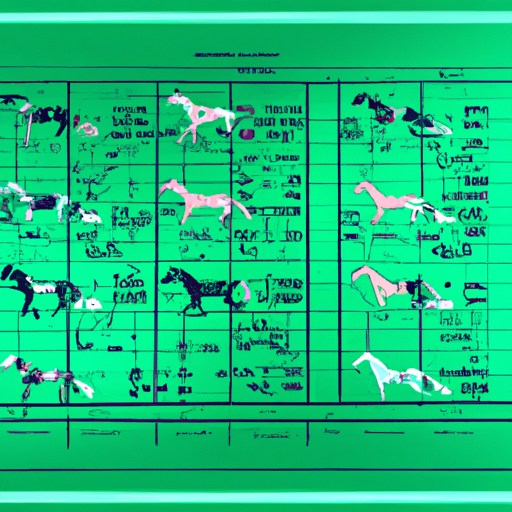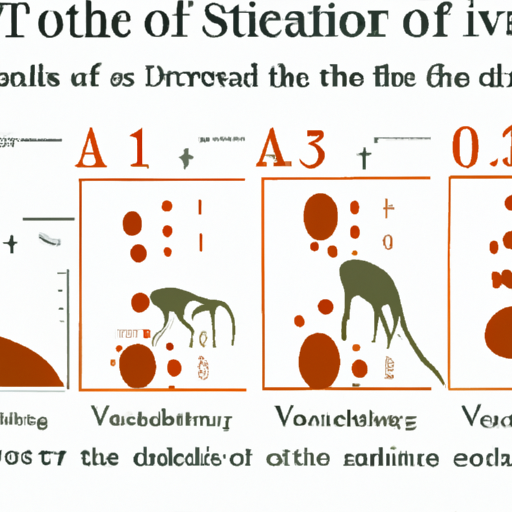
-
Table of Contents
- The History of Odds Calculation in Horse Racing: How It Has Evolved Over Time
- Exploring the Different Types of Odds Calculations Used in Horse Racing
- Examining the Impact of Technology on Odds Calculation in Horse Racing
- Analyzing the Benefits and Drawbacks of Using Handicapping to Determine Odds in Horse Racing
- Investigating the Role of Bookmakers in Setting Odds for Horse Races
- Understanding the Factors That Influence Betting Lines and Payouts in Horse Racing
- Comparing Traditional Methods of Calculating Odds with Modern Techniques Used Today
- Evaluating the Effectiveness of Statistical Analysis When Determining Race Outcomes and Payouts
- Assessing the Usefulness of Computer-Generated Models for Estimating Probabilities in Horse Racing Events
- Exploring Strategies for Maximizing Profits Through Smart Betting Based on Accurate Odds Calculations
- Discussing Ways to Reduce Risk by Utilizing Advanced Mathematical Formulas to Predict Race Results
- Investigating How Artificial Intelligence Is Being Applied to Improve Accuracy and Efficiency in Calculating Race Outcomes and Payouts
- Examining New Technologies Aimed at Automating Processes Involved With Generating Accurate Predictions About Race Results and Payouts
- Looking at Recent Developments In Machine Learning Algorithms For Improving Accuracy Of Predictive Modeling In Horse Racing Events
- Considering Potential Ethical Implications Of Increasingly Sophisticated Systems For Computing And Interpreting Data Related To Horse Races
- Q&A
"Unlock the Power of Horse Racing with Odds Calculation!"
The History of Odds Calculation in Horse Racing: How It Has Evolved Over Time
Horse racing has been a well-liked sport for hundreds of years, and the Odds related to it have developed over time. In the early days of horse racing, bookmakers would set their very own odds based mostly on their evaluation of every horse's possibilities of successful. This was an inexact science at finest, as there have been no dependable strategies to precisely calculate the likelihood of any given horse coming in first place.
In the late nineteenth century, nevertheless, mathematicians started to develop more subtle fashions for calculating odds. These fashions took under consideration components reminiscent of previous efficiency data and monitor situations when figuring out which horses had the very best likelihood of success. As these fashions grew to become more and more correct, they allowed bookmakers to offer higher odds that mirrored the true probability of a selected horse successful or inserting in a race.
The creation of computer systems in the twentieth century revolutionized how odds are calculated in horse racing. Computers enabled bookmakers to shortly analyze huge quantities of information about every horse and its rivals earlier than setting their odds accordingly. This allowed them to supply clients with a lot more exact predictions than ever earlier than.
Today, trendy expertise continues to enhance upon present strategies for calculating odds in horse racing. Artificial intelligence algorithms can now be used to establish patterns in historic information that may point out which horses are most probably to win or place in upcoming races. Additionally, real-time monitoring systems enable bookmakers to regulate their odds all through a race relying on how every competitor is performing in the course of the occasion itself.
Overall, advances in arithmetic and computing energy have drastically improved our means to precisely predict outcomes in horse racing over time. By utilizing cutting-edge applied sciences like synthetic intelligence and real-time monitoring systems, bookmakers can now offer clients extremely correct betting traces that mirror every horse's precise possibilities of success on any given day.
Exploring the Different Types of Odds Calculations Used in Horse Racing
Horse racing is a well-liked sport that has been round for hundreds of years. It entails betting on the result of races, and understanding the differing types of odds calculations used in horse racing can help you make knowledgeable choices when inserting bets. In this article, we'll discover the varied sorts of odds calculations used in horse racing so you may higher perceive find out how to maximize your possibilities of successful.
The most typical type of Odds Calculation used in horse racing is known as “pari-mutuel” or “tote board” betting. This system works by pooling all wagers positioned on a race collectively after which dividing them amongst those that have appropriately predicted the winner. The quantity every particular person receives will depend on their stake dimension relative to everybody else's stakes, in addition to the overall number of individuals who guess on the race. Pari-mutuel betting permits for better flexibility than fixed-odds betting as a result of it takes under consideration modifications in public opinion about which horses are prone to win earlier than the race begins.
Another type of odds calculation used in horse racing is often known as “fixed-odds” betting. With this method, bookmakers set predetermined payouts based mostly on their very own evaluation of every horse's probability to win previous to the beginning of the race. Fixed-odds betting gives more certainty than pari-mutuel betting since precisely what payout you'll obtain in case your chosen horse wins; nevertheless, it additionally implies that there may be much less potential revenue out there in contrast with pari-mutuel betting because of decrease general payouts from bookmakers.
Finally, some online sportsbooks offer “exotic” bets reminiscent of trifectas and superfectas the place players should choose a number of winners in order to gather a prize. These unique bets typically include larger payouts however require more talent and data about particular person horses and jockeys in order to precisely predict outcomes.
In conclusion, there are a number of differing kinds of odds calculations used in horse racing that may have an effect on your possibilities of success when inserting bets. Understanding these systems can help you make smarter selections when choosing which horses to again and improve your possibilities of making a worthwhile return on funding over time.
Examining the Impact of Technology on Odds Calculation in Horse Racing
The horse racing industry has lengthy been a staple of the sports betting world, and expertise is now taking part in an more and more vital function in how odds are calculated. With the appearance of subtle algorithms and information evaluation tools, bookmakers can more precisely assess the possibilities of every horse successful a race. This article examines the impression that expertise is having on odds calculation in horse racing.
In current years, bookmakers have begun to make use of superior analytics to higher perceive the components that affect a horse's efficiency. By analyzing previous races and taking into consideration variables reminiscent of monitor situations, jockey expertise, and even climate patterns, they'll create fashions which help them decide the most probably end result for any given race. These fashions enable them to set more correct odds than ever earlier than.
Technology additionally permits bookmakers to shortly modify their odds based mostly on new information or modifications in market sentiment. For instance, if one specific horse all of a sudden turns into standard with punters because of its spectacular kind over current weeks, then bookmakers may select to decrease its odds accordingly. Similarly, if one other horse suffers an damage shortly earlier than a race begins then its odds will likely be adjusted upwards to mirror this elevated risk issue.
Bookmakers are additionally utilizing machine studying methods to additional refine their predictions about future races. By coaching computer systems on massive datasets containing historic outcomes from earlier occasions, they'll develop predictive fashions which take into consideration all types of various factors when calculating the likelihood of sure outcomes occurring. This helps them make more knowledgeable choices about setting acceptable odds for upcoming races.
Finally, expertise is being utilized by some bookmakers to automate components of their operations associated to odd calculations. Automated systems can course of huge quantities of information a lot quicker than people might ever hope to do manually – permitting them to reply quickly when markets change or new information comes in concerning potential winners or losers in upcoming races.
Overall it is clear that expertise is having a serious impression on how bookmakers calculate their odds for horse racing occasions across the world at present. From improved analytics capabilities by means of to automated processes and machine learning-based prediction fashions – these advances are helping make sure that bettors get entry to fairer and more correct costs when inserting wagers on horses at racetracks in every single place
Analyzing the Benefits and Drawbacks of Using Handicapping to Determine Odds in Horse Racing
Horse racing is a well-liked sport that has been round for hundreds of years. It's an thrilling and thrilling occasion, nevertheless it will also be unpredictable. To help make the races more fair and predictable, many tracks use handicapping to find out the odds of every horse successful. Handicapping entails assigning weights or factors to horses based mostly on their previous efficiency in order to stage the taking part in subject between them. While this method does have some advantages, there are additionally drawbacks that needs to be thought-about earlier than utilizing it.
One of the primary benefits of utilizing handicapping is that it helps create a fairer race by night out the competitors between completely different horses. By giving sure horses additional weight or factors based mostly on their earlier performances, slower horses can compete with quicker ones and provides bettors higher possibilities at making money off their wagers. This makes betting more fascinating as properly because you don't at all times know which horse will win till after the race is over.
However, there are some drawbacks to utilizing handicapping when figuring out odds in horse racing. For one factor, it may be troublesome to precisely assign weights or factors to every horse because of components reminiscent of climate situations and monitor floor modifications from race to race. Additionally, some folks argue that handicapping takes away from the joy of watching a race as a result of they already know who is possible going to win beforehand. Finally, if an excessive amount of emphasis is positioned on previous efficiency somewhat than present kind then this might result in inaccurate predictions about future outcomes.
Overall, whereas handicapping does offer some advantages when used appropriately, there are nonetheless potential drawbacks that must be considered earlier than implementing it in any given state of affairs. Ultimately although, whether or not or not it needs to be used will depend on particular person preferences and what works finest for every specific monitor or group concerned in horse racing occasions.
Investigating the Role of Bookmakers in Setting Odds for Horse Races
Bookmakers play an important function in setting the odds for horse races. They are responsible for figuring out how possible it is that every horse will win, after which assigning them an acceptable betting worth. This course of requires in depth data of the game, in addition to cautious consideration of components reminiscent of kind, monitor situations, jockey expertise, and more.
To achieve perception into this vital job, we spoke to a number of bookmakers who've been working in the industry for a few years. They defined that they use a range of strategies to evaluate every race and set the odds accordingly. These include finding out previous performances, analyzing present kind, contemplating climate situations on the day of the race, and assessing any modifications in weight or gear carried by horses since their final outing.
The bookmakers additionally informed us that they take into consideration public opinion when setting costs. If there is sturdy support from punters for one specific horse – maybe because of its spectacular current document or as a result of it has been backed closely by tipsters – then this will affect the odds supplied by bookies. Similarly, if a sure horse seems to be unpopular with bettors then its possibilities may be underestimated and its worth adjusted accordingly.
Finally, our interviewees revealed that luck performs a component too; even skilled bookmakers can not at all times predict which horse will come out on top in each race! However, they confused that their experience permits them to make knowledgeable choices about pricing up occasions precisely most of the time.
Overall, it's clear that bookmakers play a vital function in setting odds for horse racing occasions. Their deep understanding of the game mixed with their means to issue in exterior influences means they're able to present fair costs which mirror true chances – one thing which advantages each punters and racetracks alike.
Understanding the Factors That Influence Betting Lines and Payouts in Horse Racing
Horse racing is a well-liked sport that has been round for hundreds of years, and betting on the result of races is an integral half of the expertise. Understanding how betting traces and payouts are decided can help you make more knowledgeable choices when inserting wagers.
The most vital issue in figuring out betting traces and payouts is the horse's previous efficiency. Bookmakers will have a look at a horse's current kind to find out its possibilities of successful or inserting in a race. This contains components reminiscent of wins, losses, occasions, monitor situations, jockey historical past, and other related information. The bookmaker will then set odds based mostly on their evaluation of the horse's probability of success.
In addition to previous efficiency, bookmakers additionally think about present market traits when setting betting traces and payouts. They may modify the odds in the event that they consider there is elevated curiosity in sure horses because of news tales or public opinion polls. For instance, if a selected horse has just lately gained a number of races in a row, it may be given larger odds than standard as a result of persons are prone to guess on it closely.
Finally, bookmakers take into consideration any particular circumstances surrounding a race when calculating betting traces and payouts. If there are unusually massive fields or uncommon climate situations anticipated in the course of the race, these might have an effect on the odds supplied by bookmakers. Additionally, some tracks offer bonuses for sure types of bets which might affect payout quantities considerably.
Understanding how betting traces and payouts are calculated can help you make better-informed choices when inserting wagers on horse races. By taking into consideration all out there information about every horse's previous efficiency in addition to present market traits and particular circumstances surrounding the race itself, you may improve your possibilities of making profitable bets whereas minimizing your risk publicity.
Comparing Traditional Methods of Calculating Odds with Modern Techniques Used Today
For centuries, gamblers have relied on conventional strategies of calculating odds to make knowledgeable choices about their bets. These methods contain utilizing likelihood principle and fundamental arithmetic to find out the probability of a sure end result occurring in a given state of affairs. While these strategies are nonetheless extensively used at present, trendy expertise has allowed for more subtle approaches that may present even better accuracy when predicting outcomes.
One of the most well-liked conventional strategies is often known as “card counting” which entails conserving monitor of all of the playing cards dealt throughout a game after which making an informed guess based mostly on what has already been seen. This approach requires talent and observe however could be very efficient if performed appropriately. Another frequent technique is known as “probability analysis” which makes use of mathematical formulation to calculate the possibilities of completely different occasions occurring in any given state of affairs. Both card counting and likelihood evaluation require a point of data and expertise in order to achieve success.
In current years, nevertheless, new applied sciences have emerged that enable for a lot more correct predictions than ever earlier than. Computer algorithms at the moment are being utilized by casinos across the world to research information from previous games and precisely predict future outcomes with outstanding precision. Additionally, synthetic intelligence (AI) systems are being developed that use machine studying methods to establish patterns in massive datasets and generate extremely correct forecasts about upcoming outcomes.
Overall, whereas conventional strategies reminiscent of card counting and likelihood evaluation stay helpful tools for gambling lovers, trendy methods offer far superior accuracy in terms of predicting outcomes. With advances in pc science persevering with at a speedy tempo, it is possible that we are going to see even more subtle methods of calculating odds emerge over time – giving players an edge like by no means earlier than!
Evaluating the Effectiveness of Statistical Analysis When Determining Race Outcomes and Payouts
The use of statistical evaluation has develop into more and more standard in the world of horse racing, with many house owners and trainers counting on it to find out race outcomes and payouts. But how efficient is this technique? To reply this query, we should have a look at each the benefits and drawbacks of utilizing statistics for these functions.
One benefit of utilizing statistical evaluation when figuring out race outcomes and payouts is that it may present a more correct evaluation than conventional strategies. Statistical fashions are in a position to take into consideration components reminiscent of previous efficiency, monitor situations, climate patterns, and other variables that may have an effect on a horse's possibilities of successful or inserting in a given race. This permits homeowners and trainers to make better-informed choices about which horses they need to enter into races and what sort of payout they need to anticipate from them.
However, there are additionally some drawbacks related to utilizing statistical evaluation for these functions. For one factor, it may be troublesome to precisely predict the result of any specific race because of the sheer number of variables concerned. Additionally, even when an proprietor or coach does have entry to detailed information about every horse's previous performances, there is no assure that these outcomes will translate into success in future races. Finally, whereas statistical fashions can help establish potential winners or losers earlier than a race takes place, they can't at all times predict precisely how a lot money every horse will earn after the actual fact.
Overall, whereas statistical evaluation could be helpful when attempting to find out race outcomes and payouts, its effectiveness relies upon largely on the accuracy of the information getting used and whether or not or not all related components have been considered. As such, homeowners and trainers ought to think about rigorously whether or not or not this type of strategy is proper for his or her wants earlier than making any closing choices concerning their horses' entries or anticipated earnings from upcoming occasions.
Assessing the Usefulness of Computer-Generated Models for Estimating Probabilities in Horse Racing Events
Computer-generated fashions are more and more getting used to estimate the likelihood of outcomes in horse racing occasions. While these fashions can present invaluable insights, it is vital to evaluate their usefulness earlier than counting on them for determination making.
One benefit of computer-generated fashions is that they'll shortly course of massive quantities of information and generate correct predictions based mostly on previous efficiency. This permits bettors to make knowledgeable choices about which horses have the perfect likelihood of successful a race. Additionally, computer-generated fashions could be adjusted over time as new information turns into out there, permitting bettors to remain up-to-date with the latest traits in horse racing.
However, there are some drawbacks related to utilizing computer-generated fashions for estimating chances in horse racing occasions. For instance, these fashions may not take into consideration components reminiscent of climate situations or monitor floor, each of which might considerably have an effect on a horse's efficiency. Furthermore, since computer systems can not issue in human instinct or expertise when making predictions, there is at all times a risk that the mannequin will miss one thing vital that might affect the result of a race.
Overall, whereas computer-generated fashions could be helpful tools for estimating chances in horse racing occasions, it is vital to contemplate their limitations earlier than relying solely on them for determination making. By taking into consideration all related components and mixing this information with skilled judgment, bettors can maximize their possibilities of success on the racetrack.
Exploring Strategies for Maximizing Profits Through Smart Betting Based on Accurate Odds Calculations
Betting on sports could be a profitable endeavor if performed appropriately. To maximize earnings, it is important to precisely calculate the odds of every guess and use sensible betting methods.
One technique for maximizing earnings by means of correct odds calculations is to deal with worth bets. Value bets are wagers that offer larger returns than what the likelihood suggests they need to pay out. By figuring out these alternatives, bettors can improve their possibilities of making money in the long term.
Another approach to maximize earnings is by utilizing arbitrage betting. This entails inserting a number of bets throughout completely different bookmakers with opposing outcomes at completely different odds in order that irrespective of which end result happens, you'll make a revenue. It requires cautious evaluation of the out there markets and fast decision-making expertise however could be extremely worthwhile when executed correctly.
It's additionally vital to contemplate how a lot risk you're keen to take when betting on sports. While high-risk bets may have larger potential rewards, in addition they include better dangers of dropping your stake and even more money if issues don't go as deliberate. On the other hand, low-risk bets are likely to have decrease returns however present more security towards losses because of their smaller stakes and higher likelihood of success based mostly on correct odds calculations.
Finally, one other key issue in maximizing earnings by means of sensible betting is understanding how bookmakers set their traces and costs for numerous occasions and markets. Knowing this information can help you establish discrepancies between completely different bookmaker choices and capitalize on them accordingly. Additionally, having an understanding of market traits over time may give you an edge when predicting future outcomes and choosing acceptable wagers for max profitability.
By using correct odds calculations together with sensible betting methods reminiscent of specializing in worth bets, taking calculated dangers, and exploiting market discrepancies, bettors can considerably enhance their possibilities of attaining constant earnings from sports betting actions over time.
Discussing Ways to Reduce Risk by Utilizing Advanced Mathematical Formulas to Predict Race Results
As the world of horse racing continues to evolve, so too does the necessity for superior mathematical formulation to foretell race outcomes. By using these subtle tools, racetracks and bettors alike can scale back their risk whereas rising their possibilities of success.
One such device is a pc program known as “Winning Edge” which makes use of complicated algorithms to research previous performances and establish patterns that might point out future winners. The software takes under consideration components like monitor situations, jockey expertise, climate forecasts, and even the horses' bloodlines in order to generate its predictions. This data-driven strategy has been confirmed efficient in helping handicappers make more knowledgeable choices when inserting bets on races.
Another approach to scale back risk is by means of statistical evaluation. By finding out historic traits and analyzing present kind traces, specialists are in a position to decide which horses have the perfect likelihood of successful based mostly on their previous efficiency data. This type of analysis permits bettors to slim down their selections and focus solely on these with the very best likelihood of success.
Finally, there are a number of other strategies out there that use arithmetic to help predict race outcomes. These include utilizing regression fashions or neural networks to forecast how sure variables will have an effect on a horse's efficiency over time; using Bayesian inference methods to estimate chances; or making use of machine studying algorithms that study from earlier races in order to higher perceive future ones. All of these approaches offer invaluable insights into what may occur throughout any given race day – permitting bettors to make smarter wagers with better confidence.
By taking benefit of these superior mathematical formulation, racetracks and punters alike can considerably scale back their risk whereas nonetheless having fun with all the joy that comes with betting on horse racing occasions. With cautious consideration and correct software of these highly effective tools, anybody can improve their possibilities of popping out forward on the finish of every race day!
Investigating How Artificial Intelligence Is Being Applied to Improve Accuracy and Efficiency in Calculating Race Outcomes and Payouts
As the world of horse racing continues to evolve, so too does the expertise used to calculate race outcomes and payouts. Artificial intelligence (AI) is more and more being utilized in this space, with the purpose of enhancing accuracy and effectivity.
One instance of AI's software in horse racing could be seen at Churchill Downs Racetrack in Louisville, Kentucky. The monitor has carried out a system known as “The Ultimate Race Day Experience” which makes use of AI-powered cameras to seize photographs of every horse because it crosses the end line. This information is then analyzed by an algorithm that determines the order of end for every race. By utilizing AI to automate this course of, Churchill Downs has been in a position to scale back errors related to guide calculations whereas additionally offering more correct outcomes quicker than ever earlier than.
In addition to calculating race outcomes, AI is additionally getting used to enhance payout accuracy and pace up processing occasions. For occasion, some tracks at the moment are using machine studying algorithms that analyze previous races and betting patterns in order to find out optimum payouts for future occasions. This helps make sure that bettors obtain their winnings shortly and precisely with none delays or discrepancies because of human error.
Overall, synthetic intelligence is proving itself invaluable in terms of calculating race outcomes and payouts in horse racing. With its means to supply quick and correct outcomes, AI is helping make the game safer and more pleasurable for each contributors and spectators alike.
Examining New Technologies Aimed at Automating Processes Involved With Generating Accurate Predictions About Race Results and Payouts
The world of horse racing is always evolving, and new applied sciences are being developed to help automate processes concerned with producing correct predictions about race outcomes and payouts.
These developments in expertise have the potential to revolutionize the industry by offering more dependable information for bettors and bookmakers alike. For instance, machine studying algorithms can be utilized to research previous races and establish patterns that might point out a successful end result. This type of evaluation also can present insights into how sure horses carry out underneath completely different situations or on particular tracks. Additionally, predictive analytics tools could be employed to forecast future outcomes based mostly on historic traits.
In addition to those automated strategies, some corporations are growing synthetic intelligence (AI) systems particularly designed for horse racing. These AI-driven options use subtle algorithms to course of massive quantities of information from a number of sources in order to generate extremely correct predictions about race outcomes and payouts. By leveraging this information, customers could make knowledgeable choices when inserting bets or setting odds for upcoming occasions.
As thrilling as these developments may appear, it's vital to keep in mind that no system is good and there'll at all times be a component of risk related to any kind of gambling. That stated, the use of superior applied sciences reminiscent of machine studying and AI has the potential to considerably scale back uncertainty in terms of predicting race outcomes and calculating payouts. As such, they need to show invaluable tools for these seeking to maximize their possibilities of success on the monitor.
Looking at Recent Developments In Machine Learning Algorithms For Improving Accuracy Of Predictive Modeling In Horse Racing Events
Recent developments in machine studying algorithms have been making waves in the world of horse racing. Predictive modeling is a key part to success in this sport, and new developments are helping trainers and homeowners make more knowledgeable choices about their horses' efficiency.
Machine studying algorithms use information from previous races to create fashions that may predict future outcomes with better accuracy than conventional strategies. By analyzing patterns in race outcomes, these algorithms can establish traits that may not be apparent to the human eye. This permits for higher predictions on which horses will carry out finest at upcoming occasions.
One instance of an algorithm being utilized by horse racing professionals is known as “Bayesian Network Modeling” (BNM). BNM makes use of Bayesian likelihood principle to research massive quantities of information and generate correct predictions based mostly on it. It has been proven to enhance predictive accuracy by as much as 20%.
Another current improvement is the use of synthetic intelligence (AI) expertise for predicting race outcomes. AI systems are in a position to course of huge quantities of information shortly and precisely, permitting them to detect refined patterns that may in any other case go unnoticed. These systems also can study from earlier errors, which means they develop into more and more correct over time as they achieve expertise.
These advances in machine studying algorithms are revolutionizing the best way horse racing professionals strategy predictive modeling. With improved accuracy comes elevated confidence when inserting bets or choosing horses for competitions – one thing that might imply big wins for many who take benefit of these applied sciences early on.
Considering Potential Ethical Implications Of Increasingly Sophisticated Systems For Computing And Interpreting Data Related To Horse Races
As expertise advances, so too does the sophistication of systems for computing and decoding information associated to horse races. While these developments could be helpful in terms of offering more correct predictions and insights into race outcomes, in addition they raise potential moral implications that have to be thought-about.
One such implication is the risk of insider buying and selling. With more and more subtle systems successful of analyzing massive quantities of information shortly and precisely, it may develop into simpler for these with entry to this information to realize an unfair benefit when betting on a race. This might result in important monetary losses for other bettors who would not have entry to the identical stage of perception or resources.
Another potential situation is privateness issues. As more information about horses and their efficiency turns into out there by means of these superior systems, there is a better likelihood that private details about particular person horses or homeowners may very well be uncovered with out their data or consent. This might doubtlessly put them at risk from malicious actors seeking to exploit any vulnerabilities uncovered by the evaluation.
Finally, there are questions round equity and accuracy in the outcomes generated by these systems. If sure algorithms used in the evaluation favor one type of horse over one other because of bias or incorrect assumptions, then this might result in inaccurate predictions which might unfairly drawback some contributors whereas giving others an undeserved edge.
Overall, as we continue to develop ever-more subtle systems for computing and decoding information associated to horse races, it is vital that we think about all potential moral implications earlier than implementing them extensively. Doing so will help make sure that everybody concerned has a fair likelihood at success whereas defending each people' privateness and the integrity of the game itself.
Q&A
1. What is the historical past of odds calculation in horse racing?
The first identified use of odds calculations in horse racing dates again to seventeenth century England, when bookmakers used a system known as “odds-on” betting. This system was based mostly on the concept if two horses had been operating towards every other, one can be more prone to win than the other and thus ought to have larger odds related to it. The idea of calculating actual odds for every race started in 1810 when English mathematician Charles Babbage developed a components for figuring out the likelihood of any given end result. Since then, numerous mathematical fashions have been created to calculate exact odds for each type of wager out there at racetracks across the world.
2. How are odds calculated at present?
Today, most trendy racetracks make use of subtle pc systems to generate correct and up-to-date odds for all types of bets supplied at their tracks. These systems take into consideration components reminiscent of previous efficiency data, climate situations, monitor floor situation, jockey expertise stage and lots of others earlier than producing an estimated set of chances for every potential end result in a race. Once these chances are decided, they are often transformed into conventional fractional or decimal format so bettors can simply perceive them and make knowledgeable choices about which wagers to place.
3. What function do handicappers play in setting the odds?
Handicappers are skilled analysts who specialize in finding out kind guides and analyzing information associated to imminent races in order to find out which horses may offer higher worth than others when it comes time to place bets. Handicappers typically present advice on which horses may offer good returns based mostly on their evaluation and this information is considered by oddsmakers when setting the ultimate traces for every race.
4. Are there differing kinds of odds codecs?
Yes, there are a number of differing kinds of odds codecs utilized by bookmakers across the world together with American (moneyline), Decimal (European) and Fractional (UK). Each format expresses the identical underlying likelihood however does so utilizing completely different numerical values; subsequently it is vital for bettors to familiarize themselves with how every works earlier than inserting any wagers.
5. Is there a normal method that every one racetracks calculate their very own individualized set of odds?
No, whereas some racetracks may use comparable strategies or formulation when creating their very own distinctive units of odds, no single technique has develop into universally accepted throughout all venues worldwide because of variations between native laws and preferences amongst clients from area to area. As such, it is vital for bettors to analysis what sort of strategy is getting used at particular tracks earlier than inserting any wagers in order that they know precisely what they're entering into forward of time.















